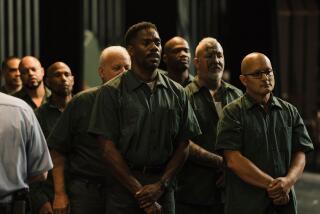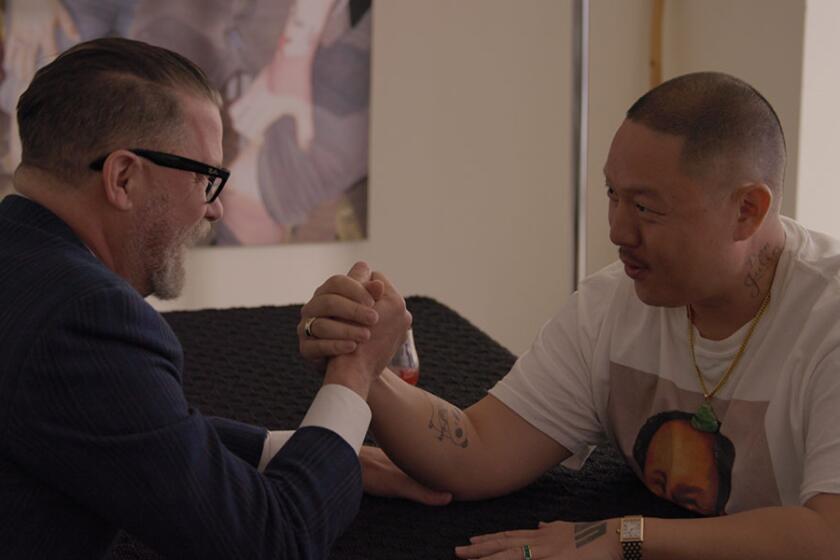Parenthood, Italian style
“The Keys to the House,” the fine new film by Italian director Gianni Amelio, moves us not only because of what it does but also because of what it does not do. It takes a story that could be turned into the most florid kind of tear-jerker and instead tells it with an exactness and a restraint that makes it powerfully effective.
Followers of Amelio, one of his country’s most respected directors, already know about his masterful ability to bring intensity and discretion to realistic material. Two of his earlier films, “Stolen Children” and “Lamerica,” were well-received here, and “Keys” is Italy’s Oscar entry this year for best foreign-language film.
Its narrative, co-written by Amelio and loosely inspired by a book called “Born Twice” by Giuseppe Pontiggia, tells a story both simple and complex. A man is reunited with a son he has never seen. A son he abandoned. A son with serious physical and psychological disabilities due to trauma at birth.
Gianni (Kim Rossi Stuart), now remarried with a new infant child, did not initiate this reunion. His son’s family on his mother’s side, told by doctors that the experience of meeting his biological father might help his condition, arrange for Gianni to meet him on a train and take him to Berlin for rehabilitative physical therapy sessions.
Issues of responsibility aside, Gianni is nervous about this reunion. Very much our surrogate, he echoes a commonly felt uncertainty about how to react in the face of serious disability.
For Gianni’s son Paolo is a 15-year-old boy with the troubled psychological state of someone considerably younger, a boy who determinedly hobbles along with the help of an orthopedic cane and says completely unexpected things like “You can’t imagine all the stuff they’ve told me. They’ve told me you’re my father.”
Director Amelio has said he wouldn’t have made “Keys” if he hadn’t found Andrea Rossi, the young man who plays Paolo, and it is easy to see why. For though he shares Paolo’s symptoms, Andrea was eager to be in the movie, and, fitted with a special earpiece, simply repeated the lines fed to him by the director. It is a jury-rigged system that works better than anyone might anticipate.
Paolo turns out to be someone with a singular sensibility, a boy who lives in a kind of tangential reality. With the connections in his mind working differently from what is considered normal, he is as capable of pithy comments as completely tuning out. What he never is, is the same way twice.
Spending time with him makes it easy to understand what Paolo’s foster father means when he tells Gianni, “You don’t deserve him.”
Given also how positive Paolo is, how willing to embrace life and get on with things, it is not difficult to see why his father, feeling simultaneously exhilarated, embarrassed and protective, starts to fall in love with the son he never knew.
Yet it is the strength of this film that it never lets you forget that Paolo, his spirit notwithstanding, is not and never will be at all an easy or a standard person to deal with. He can, at a moment’s notice, turn maddeningly stubborn and willful, completely beyond reason and control.
Reinforcing this point is Nicole, the mother of an even more disabled child that Gianni meets at the rehabilitation hospital. Played by the ever-versatile Charlotte Rampling, looking as ordinary as she can manage, Nicole is in effect the voice of the film. Sizing up Gianni as a first-time hospital parent, she tells him she’s surprised to see him there: “It’s rough the first time. This is the mother’s dirty work. Fathers can’t take it.”
How much Gianni can take and under what circumstances is what “The Keys to the House” sets out to investigate. Any relationship with Paolo is going to be a continual challenge that resists the tidy answers disability films like to provide, and this is a film that goes to all the places it should on that journey. Though it is a work of fiction, we have the sense every minute that we are watching something real, something with the unmistakable taste of life.
*
‘The Keys to the House’
MPAA rating: Unrated
Times guidelines: Adult subject matter
Kim Rossi Stuart ... Gianni
Charlotte Rampling ... Nicole
Andrea Rossi ... Paolo
A Lakeshore Entertainment, Enzo Porcelli & RAI Cinema presentation, released by Lions Gate. Director Gianni Amelio. Screenplay Gianni Amelio, Sandro Petraglia, Stefano Rulli, Cinematographer Luca Bigazzi. Editor Simona Paggi. Costumes Piero Tosi, Christina Francioni. Music Franco Piersanti. Production design Giancarlo Basili. Running time: 1 hour, 45 minutes.
In limited release.
More to Read
Only good movies
Get the Indie Focus newsletter, Mark Olsen's weekly guide to the world of cinema.
You may occasionally receive promotional content from the Los Angeles Times.











